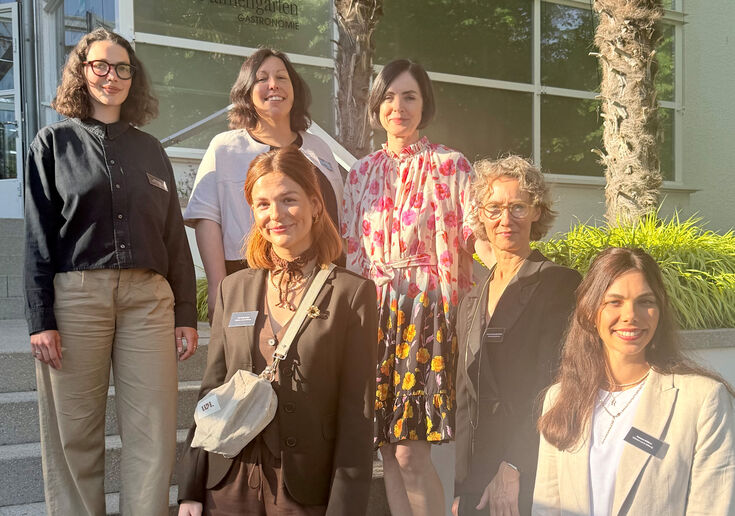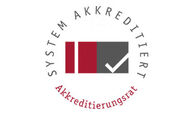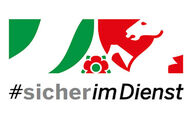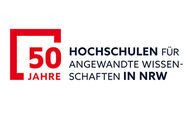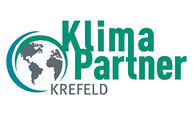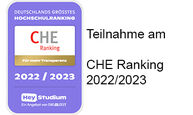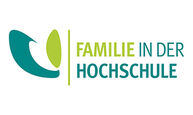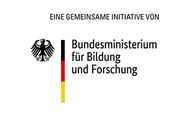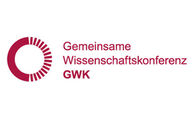Students Charlotte Weber and Ramona Möller and prospective doctoral student Rike Brendgen from the Faculty of Textile and Clothing Technology were honoured with the Wilhelm Lorch Prize for their work. The award-winning work focussed on the important fields of used clothing recycling and smart textiles in the field of medicine.
The Wilhelm Lorch Foundation's annual prize is awarded in various categories. The students and the graduate of the Niederrhein University of Applied Sciences were successful in the fields of business and technology.
Charlotte Weber and Ramona Möllers were honoured for a project on the topic of used clothing exports and the circular textile economy as part of their Bachelor's thesis at the Niederrhein University of Applied Sciences. Both are now studying for a Master's degree in Textile Products - Design. The two students focussed on the question of how education and international partnerships can contribute to the development of a global, circular textile economy. "To this end, we conducted two months of field research in Nairobi, Kenya," says Charlotte Weber. In collaboration with Africa Collect Textiles on the Kenyan side and Fynch Hatton GmbH from Mönchengladbach on the German side, and together with the local community, the effects of used clothing exports on the local textile industry were analysed and creative reuse solutions developed. "A particular highlight was a school workshop in which children wove their own school pencil cases from used textiles - with the aim of creatively teaching textile craft skills," says Ramona Möllers. The project, which was awarded 5000 euros in prize money, was supervised by Professor Dr Marina-Elena Wachs.
The two Niederrhein University of Applied Sciences students want to continue investing the money in the project: "We will continue the cooperation with Africa Collect Textiles in Kenya and Fynch Hatton - a joint collection is already being planned. Another focus is on imparting textile knowledge: We are committed to organising more workshops and educational formats - both in Germany and in Nairobi. In addition, the prize money helps us to finance further training measures and plays an important role with regard to our planned start-up project in the field of circular textile products," says Ramona Möllers. "The award gives us a boost - both professionally and personally," adds Charlotte Weber. "It makes our commitment to a fair and circular textile industry visible and gives our project new scope."
The Wilhelm Lorch Foundation honoured Rike Brendgen, a graduate and prospective doctoral student at the Niederrhein University of Applied Sciences, with a prize in the field of technology. In her master's thesis, she investigated how smart textiles can help monitor health parameters, specifically how textiles can measure blood sugar levels. "Smart textiles that are able to record such physiological values offer promising potential for increasing wearer comfort and quality of life. The growing number of diabetes cases in particular is increasing the need for user-friendly glucose measurement methods, explains Rike Brendgen. "Non-invasive alternatives that utilise sweat or saliva are becoming increasingly important." Organic electrochemical transistors (OECTs), which are sensitive biosensors that can detect ionic changes in biological fluids, offer an innovative solution.
In her work, which was supervised by Professor Dr Anne Schwarz-Pfeiffer, Rike Brendgen has already been able to develop the first materials that react sensitively to glucose in sweat. In the next step, she would like to test the long-term stability of the materials under real conditions. In addition, extending the sensor sensitivity to other biomarkers in sweat offers great potential to make smart textiles even more versatile for health monitoring. "The award means a lot to me, as I have invested a lot of time and energy in my work and this is now being recognised in a special way," says Rike Brendgen. "I will use the prize money to further advance my scientific career: Among other things, it covers the enrolment fees for my doctorate and enables me to attend exciting specialist conferences."
The Wilhelm Lorch Foundation bears the name of the founder of Deutscher Fachverlag and TextilWirtschaft, who died in 1966. For 37 years, projects and talented young people in the textile and fashion industry have been honoured in the categories of creation, business, technology and further education in retail. This year, the foundation, whose chairwoman is Prof. Dr.-Ing. habil. Maike Rabe from the Niederrhein University of Applied Sciences, selected ten convincing works from twelve award winners.


